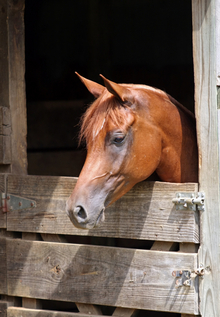A study reported in the Journal of Equine Veterinary Science discusses the stress responses of three-year-old mares to changes in housing during initial equestrian training.

Reducing stress when horse's environment changes
A study confirms what was previously thought; separating young horses from their group and stalling them in individual box stalls is perceived as stressful by the horses.
Results of the study determined that separating young horses from their group and stalling them in individual boxstalls is stressful.
The focus of the study was on what happens when horses are transferred from group housing to individual box stalls. In the study conducted in Austria, salivary cortisol concentrations (an indicator of stress), locomotion activity, and heart rate were analyzed in eight 3-year old mares.
Mares were transferred abruptly from group paddock housing to individual boxstalls without paddock access. Data were collected for 4 days while mares were in group housing and for 5 days immediately after the change in housing in individual boxstalls.
Once in boxstalls, mares underwent routine equestrian training for young horses. While in group housing, cortisol concentrations showed a diurnal rhythm with values approximately 0.6 ng/ml in the morning and a decrease throughout the day.
When horses were moved to box stalls, cortisol concentrations increased to 1.8 ng/ml within 30 minutes and did not return to baseline values for 6 hours. On the days following the housing change to box stalls, a cortisol diurnal rhythm was re-established but at a higher level compared to the level found in group housing.
Locomotion activity was higher when mares had access to a paddock than when kept in individual boxstalls and heart rate increased for approximately 60 minutes when mares were separated from their group. This study confirms what was previously thought; separating young horses from their group and stalling them in individual box stalls is perceived as stressful by the horses.
The results of this study can be important for horse owners. According to the ASPCA, when a horse must be removed from familiar housing, the owner can take steps to ensure that the horse does not become overstressed when moved into a new situation.
It’s important to progress slowly so your horse doesn’t experience any unnecessary stress. When removing the horse from her accustomed situation allowing several days so the horse can adjust to necessary changes is important.
When moving a horse to a different location or simply moving her away from her usual companions, the move can be stressful for some horses. By taking the following steps, a horse owner can greatly reduce the stress a horse goes through when a change is necessary
- Put a lead on your horse in the pasture and walk her toward the gate. As soon as she’s out of sight of her regular companions, distract her with a treat or an a calming activity. If moving is going to require trailering, walk the horse around the trailer and get her used to being near it. Wait a couple of minutes while she ivestigates the situation, then return her to the herd.
- Gradually increase the distance you take your horse away from the accustomed companions. Your goal may be to get her into a different barn, or a more isolated stall, or it may be to move her to a new home entirely, but you will need to start small and increase the distance away from the usual companions gradually over several days.
- Practice your separation exercises twice a day, once in the morning and again in the evening. With this schedule, your training sessions will be close to feeding times. When you can get your horse to go into the barn or the new stall and away from her usual companions, you can feed her a meal and help her become accustomed to new circumstances.
